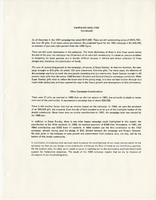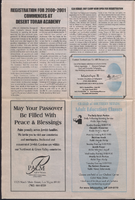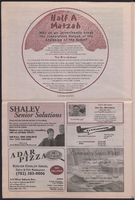Search the Special Collections and Archives Portal
Search Results

Dani McLaughlin oral history interview: transcript
Date
Archival Collection
Description
Oral history interview with Dani McLaughlin conducted by Barbara Tabach on February 14, 2018 for the Remembering 1 October Oral History Project. In this interview, Dani McLaughlin discusses the October 1, 2017 mass shooting in Las Vegas, Nevada and how she tried to find safety with her husband and a group of friends, one of whom was shot. She talks about finding refuge in her office at Atlantic Aviation. McLaughlin mentions the different ways her life and the lives of her family members have been affected, including how her children reacted to the shooting.
Text
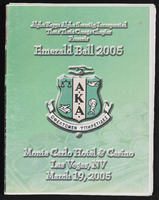
Emerald Ball (Monte Carlo Hotel)
Date
Archival Collection
Description
From the Alpha Kappa Alpha Sorority, Incorporated, Theta Theta Omega Chapter Records (MS-01014) -- Ivy Leaf magazines and event souvenir programs file.
Text
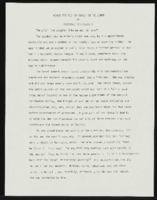
"Never Too Old To Forget Or To Learn": short story by Roosevelt Fitzgerald
Date
Archival Collection
Description
From the Roosevelt Fitzgerald Professional Papers (MS-01082) -- Short stories and poems by Roosevelt Fitzgerald file.
Text

Transcript of interview with Laura Kelly by Cindy Gaylor, February 27, 1979
Date
Archival Collection
Description
On February 27, 1979, Cindy Gaylor interviewed engineering aid accountant, Laura Kelly (born December 31st, 1928 in Silverton, Colorado) in her home in Boulder City, Nevada. The two discuss Kelly’s reasons for moving, as well as her early life in Boulder City. They also discuss Nellis Air Force Base, as well as local politics. The interview concludes with a discussion of the Civilian Conservation Corps (CCC) in Southern Nevada, during the Great Depression.
Text

Transcript of interview with James Bonnell by Gerald L. Conner, February 22, 1977
Date
Archival Collection
Description
On February 22, 1977, James Bonnell interviewed Gerald L. Connor (born 1930 in Boston, Massachusetts) about his experiences in Nevada and his work in education. Connor first talks about his move to Nevada while he was a member of the United States Air Force. He then discusses his education, including that at the University of Nevada, Las Vegas, and also describes his church membership. Connor later talks about changes in the schools and school district, the growth of gambling and properties located in Downtown Las Vegas and the Las Vegas Strip, and the early atomic tests at the Nevada Test Site. He also describes in detail his political activity and involvement with the Democratic Party, including his work with candidates for the offices of Nevada Governor and United States Senator. Towards the end of the interview, Connor talks about events such as Helldorado, the growth of the city over time, and his thoughts on the future of Las Vegas.
Text

Transcript of interview of Thalia Dondero by Mary Germain, March 13, 1976
Date
Archival Collection
Description
On March 13, 1976, Mary Germain interviewed Thalia Dondero (born 1921 in Greeley, Colorado) about her life in Nevada and her experiences as the first female commissioner for the Clark County Commission. Dondero first talks about her upbringing and her eventual move to Southern Nevada. She also discusses her involvement in extracurricular activities, such as being a leader for the Girl Scouts, and how some of those experiences led her to get involved in politics. Dondero also mentions her work with National Geographic and her passion for working with oil paintings and watercolors. The final part of the interview involves some of Dondero’s accounts as a commissioner for Clark County and some of the challenges she has faced in that position.
Text

